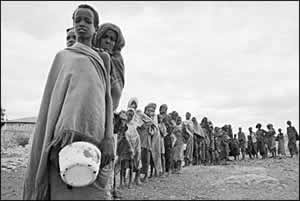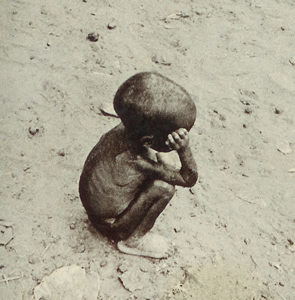Feed My Sheep — Every Day
A guest essay by Art Ammann, the former Director of the Pediatric Immunology and Clinical Research Center at the University of California Medical Center in San Francisco. In the summer of 1981, Ammann cared for a woman who was a prostitute and intravenous drug user and three of her children. All four presented with unusual deficiencies in their immune systems that were aggravated by opportunistic infections that did not fit normal medical models of disease. He determined that the mother and all three children had contracted AIDS, a tragic diagnosis because the disease was at that time fatal. Perhaps equally devastating was the disturbing conclusion, hotly contested and very controversial at the time, that HIV-AIDS was not limited to adults. Ammann determined that HIV had passed from the mother to her children as an "acquired" and not an "inherited" disease. In 1982, he thus documented the first cases of AIDS transmission from mother to infant, and also the first blood transfusion AIDS patients.
In 1998 Ammann founded Global Strategies for HIV Prevention, where today he ministers around the world. With a special focus on women and children, Global Strategies implements international strategies to prevent HIV infection and to work toward "a generation free of HIV."
For Sunday November 29, 2009
First Sunday in Advent and World AIDS Day
Lectionary Readings (Revised Common Lectionary, Year C)
Jeremiah 33:14–16
Psalm 25:1–10
1 Thessalonians 3:9–13
Luke 21:25–36
World AIDS Day, an annual event each December 1, is an attempt to remind individuals throughout the world that the HIV epidemic is not over. This year, World AIDS Day occurs in the middle of the first week of Advent. Is there something that links them together? Perhaps it is hope, but hope with two very different expectations.
One of the suggested Advent readings this year comes from Jeremiah 33. "Thus says the LORD of hosts, 'There shall again be in this place which is waste, without man or beast, and in all its cities, a habitation of shepherds who rest their flocks. In the cities of the hill country, in the cities of the lowland, in the cities of the Negev, in the land of Benjamin, in the environs of Jerusalem, and in the cities of Judah, the flocks shall again pass under the hands of the one who numbers them,' says the LORD….. The days are surely coming, says the Lord, when I will fulfill the promise I made to the house of Israel and the house of Judah. In those days and at that time I will cause a righteous Branch to spring up for David; and he shall execute justice and righteousness in the land. In those days Judah will be saved and Jerusalem will live in safety. And this is the name by which it will be called: “The Lord is our righteousness.”
 |
While the Old Testament prophet Jeremiah speaks with confidence that there will be a future of prosperity and security where God intervenes in a personal way, the New Testament words of Jesus are often more cautious. When teaching the disciples how to pray he instructs them to simply pray, “Give us this day our daily bread.” There is no hint of a future of abundance or security.
Food was a central focus in the ministry of Jesus. It was a metaphor for both the spiritual and the physical. The departure of Jesus from this earth was preceded by a celebratory dinner during which Jesus took bread, broke it into pieces and told the disciples, “Take this bread. This is my body broken for you." With the help of a child, a single fish and seven loaves of bread satisfied the hunger of 4,000 individuals. Food, or the lack thereof, was an essential component of the temptation of Jesus in the wilderness. He made it clear to his tempter that we do not live by bread alone and that when it comes down to choosing between physical hunger and spiritual compromise the temptation of turning stones into bread was not a viable option.
After the resurrection Jesus appeared to the disciples while they were fishing and invited them to eat. During the early morning meal he singled out Peter and asked if he loved him. Receiving a reply of assurance, Jesus said, "Feed my sheep." Twice more Jesus asked Peter if he loved him, and after each reply of assurance Jesus reiterated the command to “Feed my lambs and take care of my sheep.” He of course did not add "everyday" as I did in my title above. But we can assume that his disciples were fully aware that asking for daily bread was an ongoing process encompassing both the spiritual and physical feeding of others.
As short as the Lord’s Prayer is, the words “Give us this day our daily bread” compel us to acknowledge our responsibility for praying not just for ourselves, but also for those who do not have the luxury of knowing whether today will bring physical and spiritual security.
In our culture and during our time, we are likely to recite the Lord’s Prayer in a routine and perfunctory manner. Our concern about the daily availability of food, whether spiritual or physical, is unlikely to be our daily concern. Both are readily available if we want to access them. Physically, we can purchase enough food to store it in a refrigerator or freezer or with preservatives on the closet shelves and have enough for today, tomorrow and for weeks to come. If a shortage of food occurs, it can be flown in to any region of our country. Following temporary disasters, one of the first things to arrive is enough food and water for people to survive.
Spiritually, we also have abundance. Most of us have more than one Bible, numerous commentaries, have heard thousands of sermons and inspirational presentations, and read hundreds of books and magazine articles on a spiritual life. Like food, we enjoy a surplus. It seems odd, therefore, that we should continue to pray as Jesus taught, "Give us this day our daily bread.” But perhaps we pray not for ourselves but for those for whom abundance is merely a hope.
We are told that the precipitous rise in world food prices has pushed hunger to the top of humanitarian agendas. Decreasing financial support from international agencies, diminished responses from the faith based community, rising costs of fuel, severe chronic drought, rising incomes in poorer countries which increase the demand for food, and the conversion of land to grow crops for biofuels are all factors. It is estimated that at the current rate, 50% of the world’s population will encounter a shortage of food over the next decade.
How does this relate to HIV? I work with children of the HIV epidemic, 15 million of whom are orphans. Because their voices are not often heard and for the most part their names are unknown, they are often the most vulnerable whenever poverty and starvation overtake populations. I can imagine that those who pray to God must plead with him to, "Give us this day our daily bread" as a reality that they confront each morning. I am also fairly certain that they don't ask for a stockpile of food or even for enough food for an entire week.
We do lots of presentations to raise funds for children of the HIV epidemic to point out that there are 15 million of them, increasing at a rate of 6,100 each day. Out of politeness I try to answer most of the questions that follow with sensitivity, calmness, and rationality, but I must admit that it is not always easy and some of the questions wound me deeply. More than one individual has asked why we need to raise funds every year for the orphan programs (as if the children don't need to be fed every day). Once someone asked me if I felt it was right to have a fund-raising event for orphans on the Sabbath. Perhaps I should have simply quoted Jesus when he replied to the Pharisees who were critical of his disciples gathering food on the Sabbath, “Is it lawful to heal on the Sabbath?”
 |
The contrast between the Advent reading of Jeremiah and the Lord’s Prayer lays in the future versus the immediate. Advent should be remembered as consisting of both. There is immediacy to our physical and spiritual needs and long term hope that peace and justice will indeed prevail. As we celebrate Advent let us remember to pray for the entire world and to help those who are in need of daily bread every day.
“Suppose a brother or sister is without clothes and daily food. If one of you says to him, "Go, I wish you well; keep warm and well fed," but does nothing about his physical needs, what good is it? In the same way, faith by itself, if it is not accompanied by action, is dead.” James 2:15-17.
Arthur J. Ammann MD President
Global Strategies for HIV Prevention
104 Dominican Drive
San Rafael, CA 94901
arthur.ammann@globalstrategies.org
For further reflection
* A report released on October 12, 2009 in conjunction with World Food Day says that, for the first time ever, the number of undernourished people in the world has passed one billion people. This is 100 million more hungry people than in 2008. See http://www.fian.org/resources/documents/rtfn-watch/right-to-food-and-nutrition-watch-2009
Image credits: (1) MySaviorGod.com; (2) Sofia News Agency; and (3) Neil Vives, Miami-Dade College.





